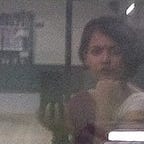Of Patriarchy they should add.
I am sick of men who think feminism and gender are irrelevant in art. Oh but you have to separate the art from the artist, they say. Oh, but men will obviously make movies for their viewing pleasure only. And depict women with a sexual, sensual allure only, they say. And like always, or a little bit better than before, I have not much to say. My strongest arguments come to me much later, after I’ve chewed on the memories of our conversations into a fine green pulp.
R said that it isn’t fair to apply literary analysis to film. That as a filmmaker he wouldn’t apply his area to literature. But that’s not how it works. Literary analysis is a study of experience. As long as there are creatures, and there are lives, literary analysis thrives. Hell, we even personalise inanimate objects to speak about their experiences although they have no consciousness of their own. So fuck you, R. You might be a filmmaker and so you think you film is about edits but that’s not true for everyone. For some of us, it is the story and the visual that keeps us there. Sometimes the music and the dialogues too. (Yes, this is mostly a rant post against idiotic misogynistic men and their holier-than-thou attitude on art, film, music, etc)
B sends me A Woman Under Influence. And Gena Rowland’s Mabel is quietly crushing my bones. It is easy to read about feminism. It is a bit harder to find the courage to talk about feminism. It is harder still to live a feminist life in patriarchy. And the more I see the lives of women around me, the more I think it’s quite impossible to live a feminist life with a cis-heterosexual man. It is one thing to fight systemic structures, but it is another to fight the conditioned drives of longing and desire you crave without giving into that hetero blueprint for women craving touch and conversation and men refusing to engage. Love is not enough, B reminds me. Oh yes, its true. In so many moments I feel indelibly for Nicky, Mabel’s husband. Nicky tries to hold on to the fantasy of the perfect, functional family. In one scene, he hugs her in desperation while she threatens self-harm, telling her he loves her. And in others, he returns to male violence because he does not understand.
This is a funny thing. There’s a sore lack of rhythm in men taking to violence and drinking and groping, when women get hysterical in different measures. Still, it is the dance of binary roles. Everyone moves to patriarchy, which dictates performance, and this performance carries the movie forward. Denying madness is a male thing, but the movie doesn’t deny madness. It runs on it. And that is perhaps the brilliance of its visual storytelling.
At one point, I give into its movements — how the music shifts with domestic desire, how her arms reach out to invite the warmth of a hug or deny the nuisance of feminine domesticity expected of her. And suddenly, her insanity or rather her non-normalness become riffs to guitar strings. Normalised in the midst of rushing traffic and a woman clad in a short dress and sweater.
In the scene where the mother comes in with the children, there is a play between mother-in-law and son-in-law. It is the rules of appropriate conduct and unnecessary lapping under the feet of male authority — even when he drags the grandma onto the bed by her armpits. But the star is still Gena. Her wild eyes, her fingers banging guns into her forehead and her shifts of the head. Even while the father and kids whistle hum, you are riveted to Gena’s performance, abruptly real — she is the centripetal force of the film. Without her madness and hysteria, everyone collapses around her like crumbled cookies.
In three moments, I find the center of gravity to this film, and its Gena. When her children’s playmates' father comes to take the child home, she says, “Come on, die for Mr. Jensen” indicating that her children mimic the climax of Black Swan. Later, when she has another breakdown she asks herself repeatedly if she is a good mother. And before, she this she tells the children, “you know in my whole life I did nothing, but make you three”. If this isn’t the absolute frustration of a woman forced into marriage, domesticity and motherhood against a space for her own thoughts, I don’t know what is. I cannot read this film for music alone or for its shots, for me each element is wound to the totem of Gena’s problem with no name that Betty Freidan writes of in The Feminine Mystique. It’s a reading practice, to choose to see this way. A connecting of the dots. The earliest scene introducing us to Gena has her running after the kids, checking off a list of things, before she lets her mother take them away. Right after, she steps on a toy, curses and then gets ready for her husband. Except she’s going to face her loneliness and not know what to do with it, and so loses herself in the chaos of the night.
I think, one of our biggest problems as women is that we are always told that marriage and children will bring us happiness. We are never told how lonely it will get, and sometimes it stems from a longing to know ourselves devoid of the men and/ or children. Just us, singular. And in the disallowance of this solitude, we crash.
The movie isn’t a great recommendation if you’re sitting with your fierce anxiety right now. Or struggling with ghosts of madnesses past and present. Watch it for Gena and her waterfall gestures. As a final note, I choose to read like this for women from all timelines, especially the ones sidelined by men like R.
